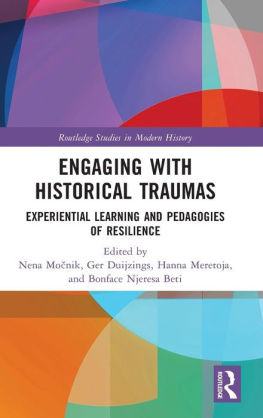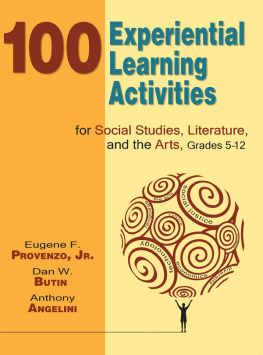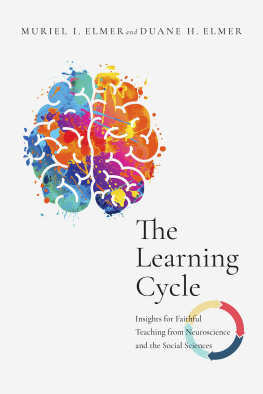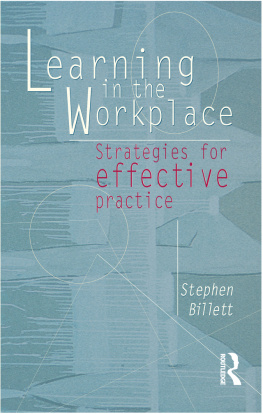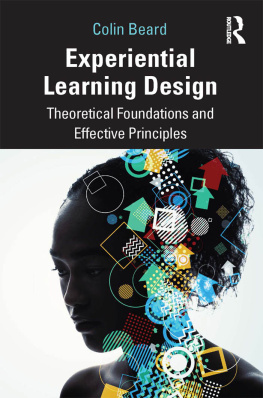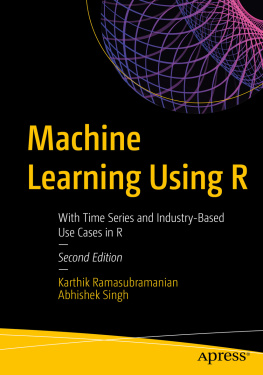EXPERIENTIAL
LEARNING
Experience as the Source of Learning and Development
Second Edition
DAVID A. KOLB
EXPERIENCE BASED LEARNING SYSTEMS, INC.
Editor-in-Chief: Amy Neidlinger
Executive Editor: Jeanne Glasser Levine
Operations Specialist: Jodi Kemper
Cover Designer: Chuti Prasertsith
Managing Editor: Kristy Hart
Project Editor: AndyBeaster
Copy Editor: Crystal Bullen
Proofreader: Audrey Jacobs
Indexer: Margaret Hentz
Compositor: codeMantra
Manufacturing Buyer: Dan Uhrig
2015 by Pearson Education, Inc.
Upper Saddle River, New Jersey 07458
For information about buying this title in bulk quantities, or for special sales opportunities (which may include electronic versions; custom cover designs; and content particular to your business, training goals, marketing focus, or branding interests), please contact our corporate sales department at or (800) 382-3419.
For government sales inquiries, please contact .
For questions about sales outside the U.S., please contact .
Company and product names mentioned herein are the trademarks or registered trademarks of their respective owners.
All rights reserved. No part of this book may be reproduced, in any form or by any means, without permission in writing from the publisher.
Printed in the United States of America
Second Printing: July 2015
ISBN-10: 0-13-389240-9
ISBN-13: 978-0-13-389240-6
Pearson Education LTD.
Pearson Education Australia PTY, Limited.
Pearson Education Singapore, Pte. Ltd.
Pearson Education Asia, Ltd.
Pearson Education Canada, Ltd.
Pearson Educacin de Mexico, S.A. de C.V.
Pearson EducationJapan
Pearson Education Malaysia, Pte. Ltd.
Library of Congress Control Number: 2014952293
For Alice
About This eBook
ePUB is an open, industry-standard format for eBooks. However, support of ePUB and its many features varies across reading devices and applications. Use your device or app settings to customize the presentation to your liking. Settings that you can customize often include font, font size, single or double column, landscape or portrait mode, and figures that you can click or tap to enlarge. For additional information about the settings and features on your reading device or app, visit the device manufacturers Web site.
Many titles include programming code or configuration examples. To optimize the presentation of these elements, view the eBook in single-column, landscape mode and adjust the font size to the smallest setting. In addition to presenting code and configurations in the reflowable text format, we have included images of the code that mimic the presentation found in the print book; therefore, where the reflowable format may compromise the presentation of the code listing, you will see a Click here to view code image link. Click the link to view the print-fidelity code image. To return to the previous page viewed, click the Back button on your device or app.
Foreword
Foreword to the First Edition
This is a very special and important book. I say that at the outset because the book is written with such grace and gentleness, with such clarity and directness, that you will know that David Kolb has written an excellent treatise on learning theory, certainly for educators and quite possibly for Educated Persons, whatever that means. But as you read onas I read on, I had to catch my breath every once in a while, wondering if the velocity of my excitement would ever cease.
Kolb has written a wonderful book, one Ive been waiting forwithout quite realizing itfor a long time. Its a book (Im only guessing here) that he took a very, very long time to write, since it is crafted so carefully and is so deeply nuanced that you are certain that its been filtered and re-set and redrafted many times, like a precious stone, turned and polished into a lapidarys gem.
Why this excitement? Well, the hyper-ventilation I alluded to above is based on Kolbs achievement in providing the missing link between theory and practice, between the abstract generalization and the concrete instance, between the affective and cognitive domains. By this BIG achievement he demonstrates conclusivelyand is the first to do sothat learning is a social process based on carefully cultivated experience which challenges every precept and concept of what nowadays passes for teaching. And with this major achievement he knowingly shifts the ecology of learning away from the exclusivity of the classroom (and its companion, the Lecture) to the workplace, the family, the carpool, the community, or wherever we gather to work or play or love.
The significance for educators is profound because, among other things, Kolb leads us (again, so gently) away from the traditional concerns of credit hours and calendar time toward competence, working knowledge, and information truly pertinent to jobs, families, and communities.
The book is no piece of cake. Despite its graceful aesthetic and illuminating diagrams, from mandalas to tight-lipped 2 2 tables that management professors love to show on the overhead screen, the author takes us on a fascinating but densely written journey in and around some of the most seminal thinkers who laid the foundations of experience-based learninggreat minds such as Dewey, Lewin, and Piaget. Nor does he neglect other auxiliary players like Maslow, Rogers, and Erikson. Aside from creating a framework that removes whatever residual guilt those of us have felt or feel when using experience-based learning within the formal classroom boundaries, Kolb provides a thick texture of understanding by building his framework on the wonderful armatures of that trinity: Dewey, Lewin and Piaget.
As I say, this is an important book, one the field has been waiting for, worth every ounce of energy it takes to read. But, because of its revolutionary undertones, read it at your own risk. For each reader must take the risk of creating a life of his or her own. When you think about it, you are the thread that holds the events of your life together. Thats what Kolb gets us to understand.
Warren Bennis, 19252014

In fond remembrance of Warren,
my mentor and friend.
About the Author
David Kolb is the Chairman of Experience Based Learning Systems (EBLS), an organization that he founded in 1980 to advance research and practice on experiential learning. EBLS conducts basic research on Experiential Learning Theory and has developed many experiential exercises and self-assessment instruments including the latest Kolb Learning Style Inventory 4.0. The EBLS program of research on experiential learning is ongoing in collaboration with an international network of researchers, practitioners and learning partners.
He received his BA in psychology, philosophy, and religion at Knox College and his Ph.D. in Social Psychology from Harvard University. He was a professor of organizational behavior and management at the MIT Sloan School of Management and at the Weatherhead School of Management, Case Western Reserve University, where he is currently Emeritus Professor of Organizational Behavior.
He is best known for his research on experiential learning and learning styles described in this book, Experiential Learning: Experience as the Source of Learning and Development. Other books include Conversational Learning: An Experiential Approach to Knowledge Creation, Innovation in Professional Education: Steps on a Journey from Teaching to Learning, and


